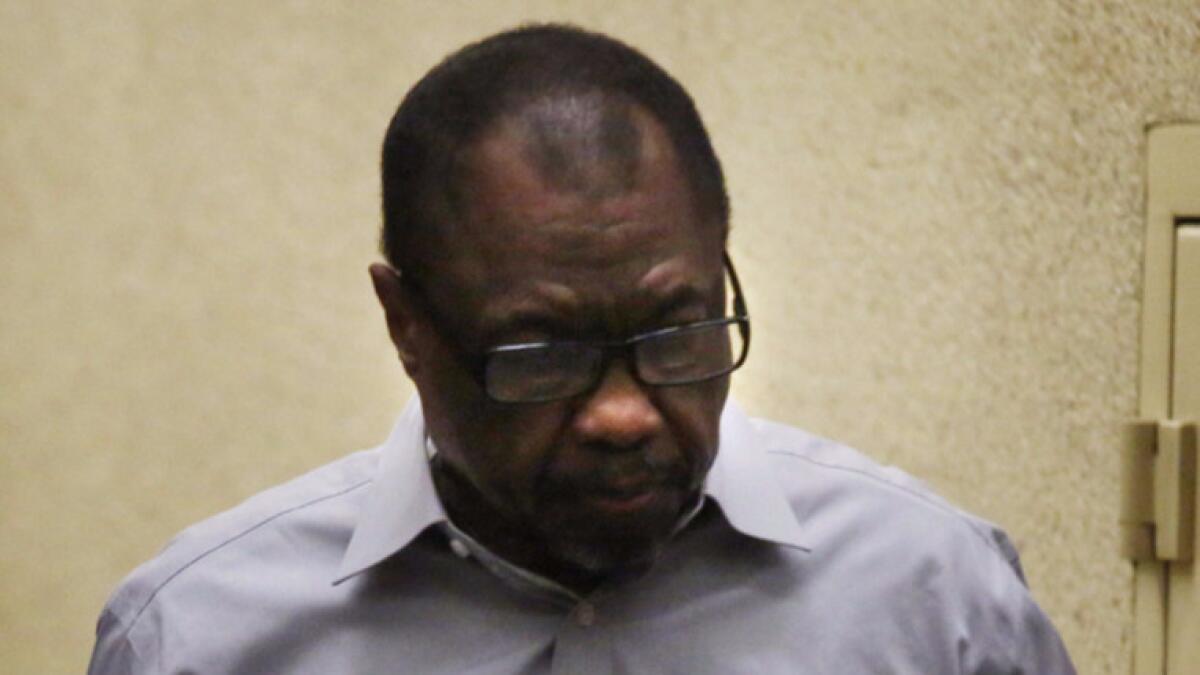Victims’ families testify in death penalty phase of Grim Sleeper trial

Kennietha Lowe recalled how the girls would don flower-print dresses and primp their hair decades ago.
She said she and her older sister, Mary, were aspiring entertainers who loved performing for their family, dancing and singing in their living room. With their cousin, the three girls emulated their idols, the all-women R&B trio the Emotions.
Mary was the lead singer and dancer. She was also their choreographer, costume designer and manager. She ran the show, Lowe recalled during testimony Thursday in a downtown Los Angeles courtroom.
As they grew older, the girls looked up to Mary in life, too. She was beautiful, with an ever-present smile and aspirations to remain in the limelight, Lowe said.
Those dreams would never come to fruition. Mary Lowe was found shot to death at the age of 26. Her murder would eventually be tied to the Grim Sleeper serial killer.
“I just can’t believe her life was lost for no reason,” Kennietha Lowe said through tears.
See the most-read stories this hour >>
Lowe’s remarks came as the penalty phase began in the trial of Lonnie David Franklin Jr., who was convicted last week of murdering nine women and a 15-year-old girl in a series of slayings over more than two decades. Jurors will consider whether to sentence Franklin, 63, to death or to life in prison without parole.
Before the family members of victims testified, Deputy Dist. Atty. Beth Silverman told jurors they would hear evidence in the coming days that proves Franklin killed five more women for which he wasn’t charged, using the same modus operandi seen in the 10 killings and one attempted murder he was convicted of.
In 1984, Georgia Mae Thomas, 43, was shot twice in the chest and dumped in an industrial yard surrounded by garbage near where other victims had been discovered. Ballistics tests, Silverman said, showed Thomas was killed by a .25-caliber handgun that police recovered from Franklin’s home.
“This was the first murder in a series of murders committed by the defendant,’’ Silverman said.
Inez Warren, 28, was found in a Gramercy Park alleyway with a gunshot wound to the chest. Sharon Dismuke, 21, was shot twice in the chest and left in an abandoned gas station with a rag stuffed in her mouth.
Ayellah Marshall, 18, vanished in 2006. Rolenia Morris, 31, a mother of two, disappeared in 2005. Their bodies have never been found, but Marshall’s Hawthorne High School ID card and a photograph of Morris, along with her driver’s license, were found inside a garage refrigerator at Franklin’s South L.A. home. The fridge, which prosecutors have called Franklin’s “trophy case,” also contained photographs of other victims.
Rochell Johnson spoke without hesitation when the prosecutor asked if she knew someone named Henrietta Wright.
“She’s my beautiful mother,” Johnson said.
Wright, 35, was found under a mattress in an alley with two gunshot wounds in 1986.
Johnson was 4 years old then, and her family was split up among relatives after her mother’s killing.
“I’ve thought about her a lot this year. I’m 34 and she was 34 when she was killed,” Johnson testified. “She still had life to live. ... She deserved to still be here.”
Samara Herard recalled for jurors how her parents took in a toddler, Princess Berthomieux, as a foster child. Herard helped her mother change the 3-year-old girl’s diapers and saw the severity of the abuse Princess had previously suffered. She had burns all over body. Her ankles and wrists were scarred by ropes. Her genitals were severely injured, Herard testified.
Then 17 years old, Herard saw Princess more as a daughter, recalling how she braided the little girl’s hair.
“We sheltered her because we were determined to never let anyone else hurt her ever again,” she said.
By the time Princess was 13, Herard had moved away with her own family. Her mother had died and her father’s health problems left him unable to care for Princess, who eventually moved in with another foster family.
During their last conversation, Herard said, Princess told her she was worried because her biological father was attempting to contact her. Herard promised her that he would never hurt her again.
“The person I was trying to protect her from was the wrong person,” Herard told jurors as Franklin sat motionless.
Princess’ body was found in an Inglewood alley in 2002. The 15-year-old had been beaten and strangled.
Donnell Alexander, whose sister Alicia Alexander was killed in 1988, testified that he and his family made a commitment to attend nearly every hearing in the criminal case since Franklin was charged in 2010.
“I need the world to know how I felt about my little sister,” Alexander, 53, told jurors.
His father, Porter Alexander, said that he has refused over the decades to remove Alicia’s belongings from their home.
“Because she’s not gone,” he said, pausing, “from my heart.”
ALSO
Police seek charges of disturbing the peace against Chris Brown over ATV antics
Charges dismissed against Black Lives Matter protesters who blocked L.A. freeway
Orange County boy who was paralyzed by hit during 2011 Pop Warner game has died
[email protected]
Twitter: @sjceasar
More to Read
Sign up for Essential California
The most important California stories and recommendations in your inbox every morning.
You may occasionally receive promotional content from the Los Angeles Times.











